Science correspondent
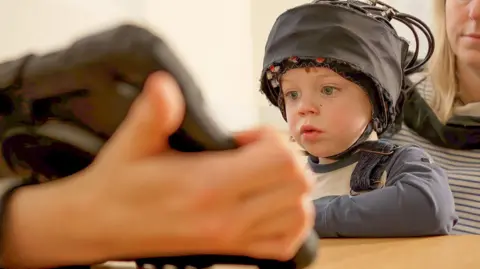 Kevin Church/BBC News
Kevin Church/BBC NewsTwo-year-old Henry is completely transfixed by the iPad in front of him. Every time a smiley face appears he taps the screen – and his tap transforms the face into a cartoon of a dancing animal.
It looks like a simple, repetitive game, but is actually a test of a fundamental skill that is developing in the toddler’s growing brain. Henry is wearing a sensor-laden cap with wires emerging from it that are attached to a large piece of analytical machinery. While Henry plays the game, the cap is scanning his brain activity and building up a picture of how well he can control his decision making.
It is a test of inhibitory control, one of the skills scientists at the University of Bristol are measuring in babies and toddlers, as part of a mission to understand how and when very young children develop abilities that enable them to focus and learn.
Scientists already know these skills are critical – but they don’t yet know at what point they are established in an infant brain.
The development of hundreds of children – from the age of six months to five years – is being tracked as they form the key skills that will shape their academic and social abilities.
But what is really special about this pioneering project is that it is a human experiment within another decades-long human experiment. The mothers of 300 of the children being studied are themselves part of a project that has monitored their health since they too were babies, in the 1990s.
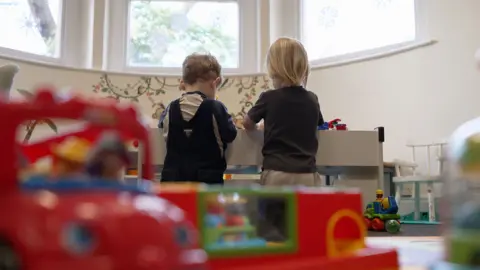 Kevin Church, BBC News
Kevin Church, BBC NewsA lifetime of data is being gathered that could reveal links between the brain development of the children being studied now and the health, experiences and genetics of their parents.
For a study of child development, already having all this rich information about the parents is “completely unique in the world”, lead researcher Dr Karla Holmboe says.
“We need to know when different skills develop and we need to understand how individual children develop over time.”
Children who are struggling when they start school tend to continue to struggle, Dr Holmboe explains.
“That can even continue into adulthood. So, there’s this whole period of development that we need to understand so we can support children at a much younger age.”
During the study, young participants and their parents are invited to the university psychology lab to play scientific games and have their brain activity measured. Many have MRI scans at the ages of six months, three years and five years, generating a true picture of their young, developing brains.
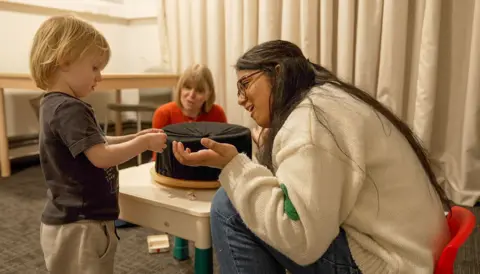 Kevin Church/BBC News
Kevin Church/BBC NewsKey to the smiley face game Henry is playing is where that face appears on the iPad screen. Just as the toddler gets used to the face repeatedly popping up on the right side of his screen, it randomly starts appearing on the other side too.
“We’re seeing if Henry can resist the urge to just keep tapping on the right,” explains research assistant Carmel Brough, “and instead look for where the smiley face is.”
This skill, explains Dr Holmboe, is critical when children start school.
“In a classroom, a child needs to be able to focus and not let their attention drift,” she says. “To learn new things, we need to be able to stop old habits.”
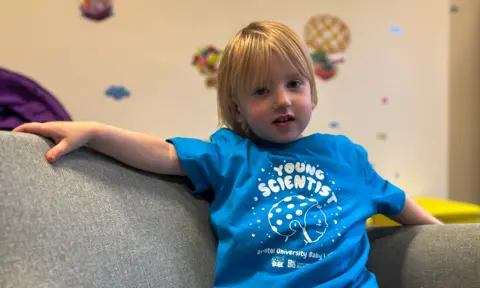 Victoria Gill/BBC News
Victoria Gill/BBC NewsIn another room, Jackson, who is also aged two, is playing a game designed to test his working memory.
A research assistant encourages him to watch as she puts stickers in different pots. The toddler is then asked to recall which pots contain stickers, and which do not. The motivating factor? Jackson can keep all the stickers he finds.
“Working memory is when we need to keep a little bit of information in our head to solve a problem or do a task – like a puzzle, or even just remembering where we put something two minutes ago,” explains Dr Holmboe. “For children, you can imagine we need these skills when we learn maths or learn to read.
“These are what I call ‘building blocks’ of really important skills.”
The study will also assess language development and processing speed – a measure of how quickly children pick up new information.
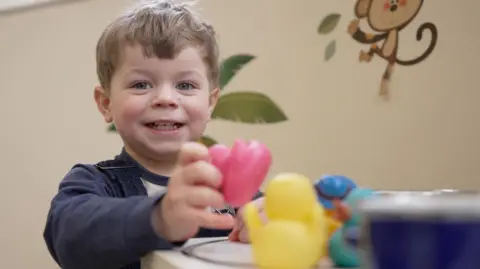 Kevin Church/BBC News
Kevin Church/BBC NewsThe Children of the 90s project is now 35 years old. Focused primarily on health, by tracking 14,500 children born between 1991 and 1992, it has revealed insights into obesity, autism and, more recently, the effect of the pandemic on mental health.
The project’s data has been made available to scientists around the world and has been cited in thousands of scientific papers.
One study of the diets of children of the 90s provided evidence that, while a child’s fussy eating is often worrying, it is unlikely to have any lasting impact on their health and development.
Thanks to repeated health-screenings that have been key to the project, it also revealed that one in five young people shows signs of fatty liver disease, and one in 40 young people may have liver scarring – caused largely by obesity and alcohol consumption. This has shown just how common the condition is and provided insights into ways it can be prevented through diet.
And the scientific revelations keep on coming. Last month, the study revealed that children who lacked oily fish in their diets were less sociable and kind.
In this latest study – of the children of the children of the 90s – scientists are looking specifically at formative abilities and brain development. They will follow each child until they start school.
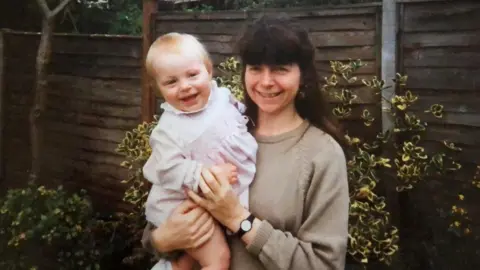 Emily Chatham
Emily ChathamEmily, who was studied as a child of the 90s, is Henry’s mum. Today, her young son sits on her lap as he works on one of the research team’s carefully designed puzzles.
“We’ve both been a part of this since birth,” Emily says. “It wasn’t a choice for me at the start – my mum signed me up. But it is now, and I just think it’s fascinating.”
Helping children to thrive in the future is the aim, Dr Holmboe says. Because when children start school, she explains “a lot of things are already set.
“This is the groundwork that will help us support children at the right time.”
Henry and Jackson finish their puzzles and games and take off their brain-scanning hats.
“My boys just love coming here,” says Emily. “They love all the toys – they get free snacks. So I’ll continue coming just as long as they want to.
“Why wouldn’t you want to be part of this and maybe help future generations?”



